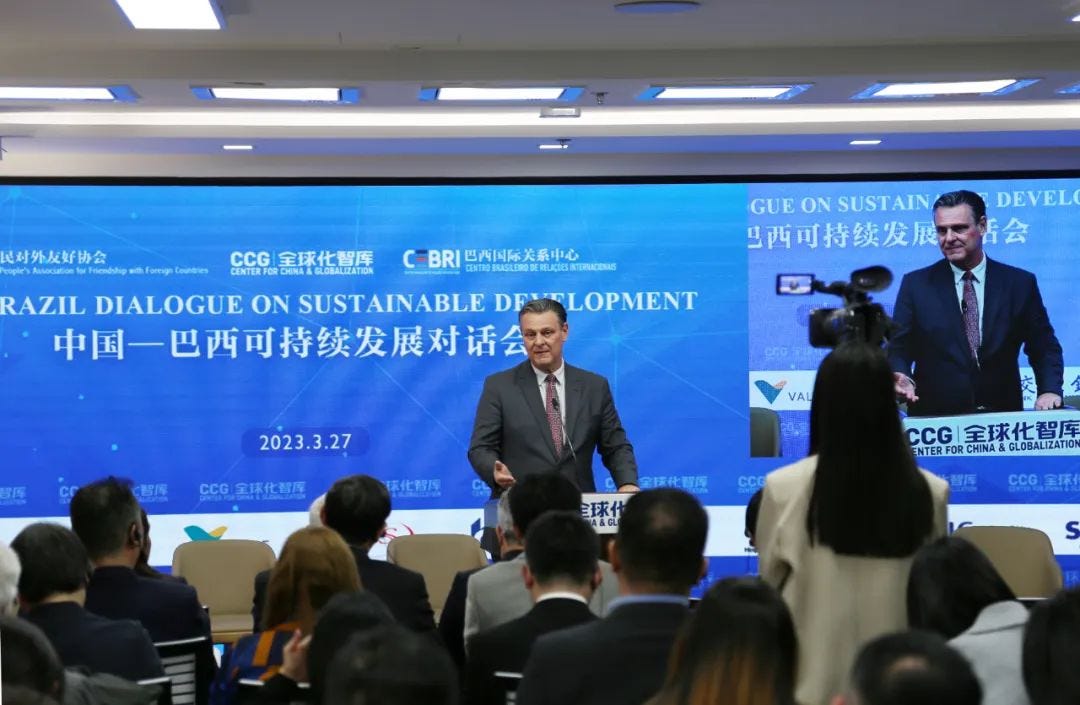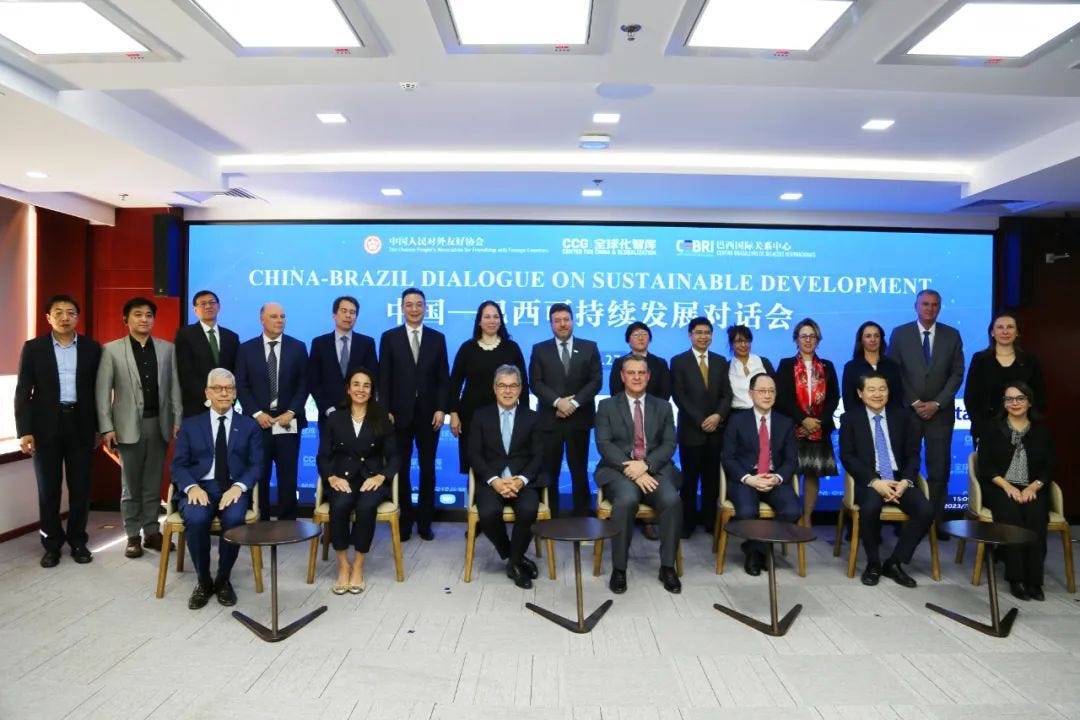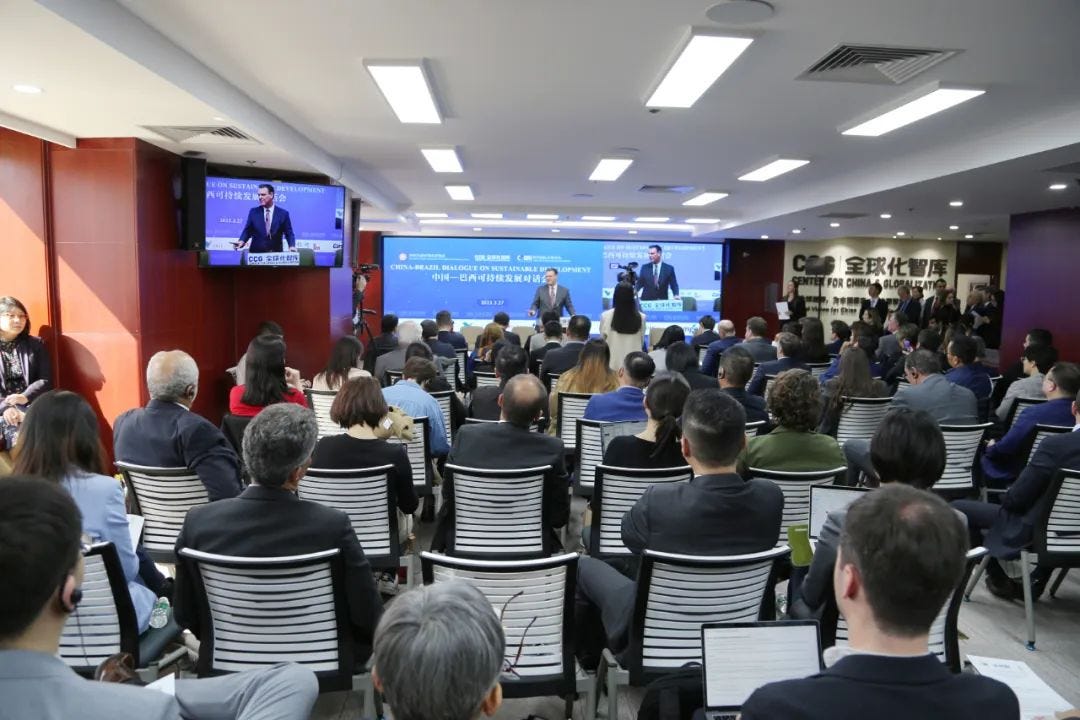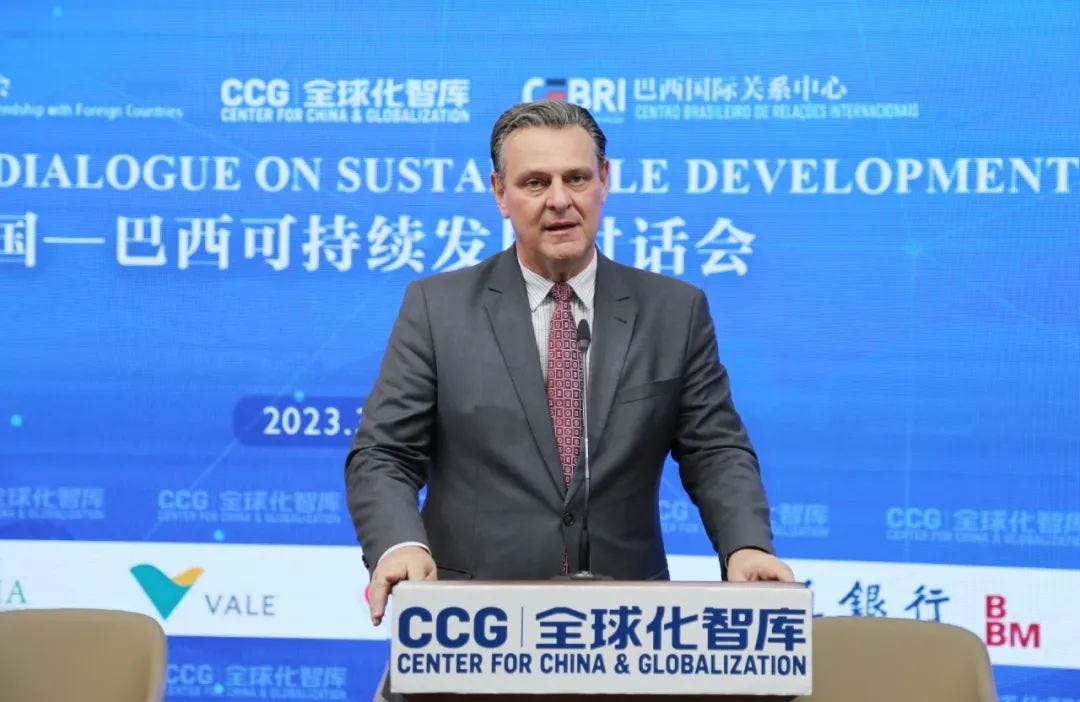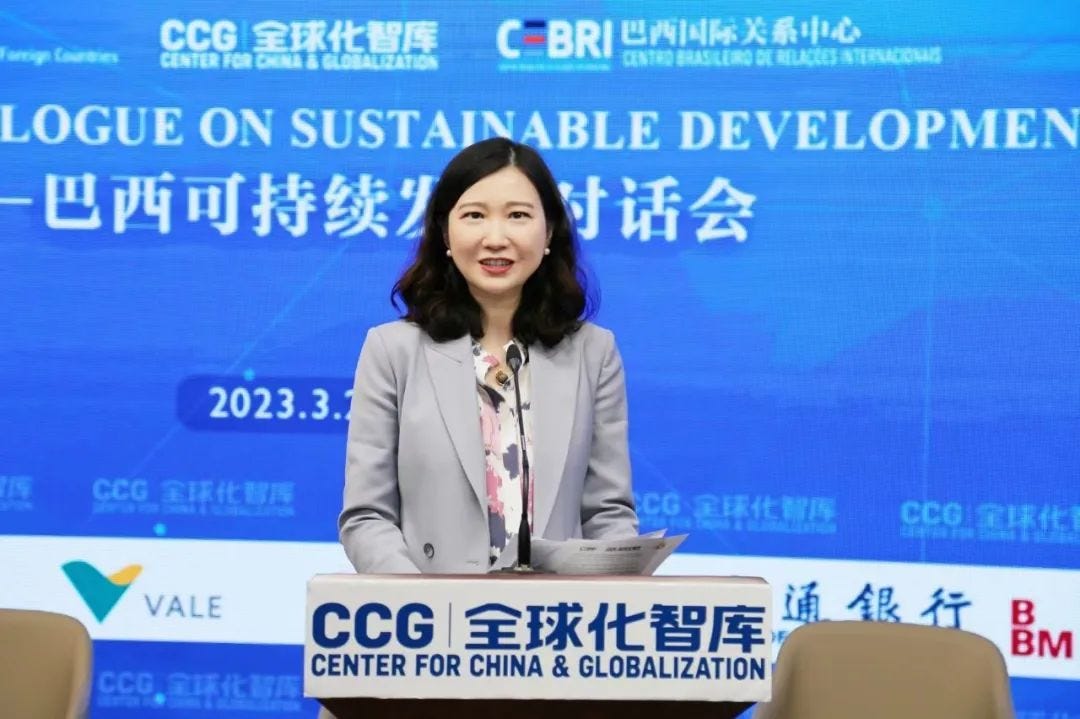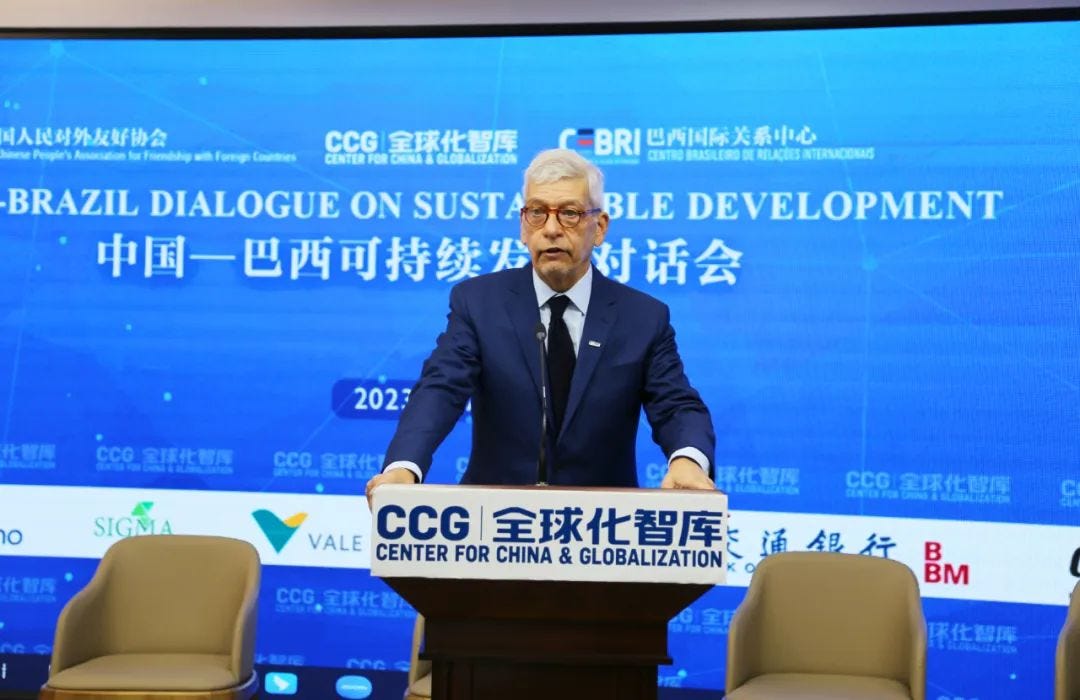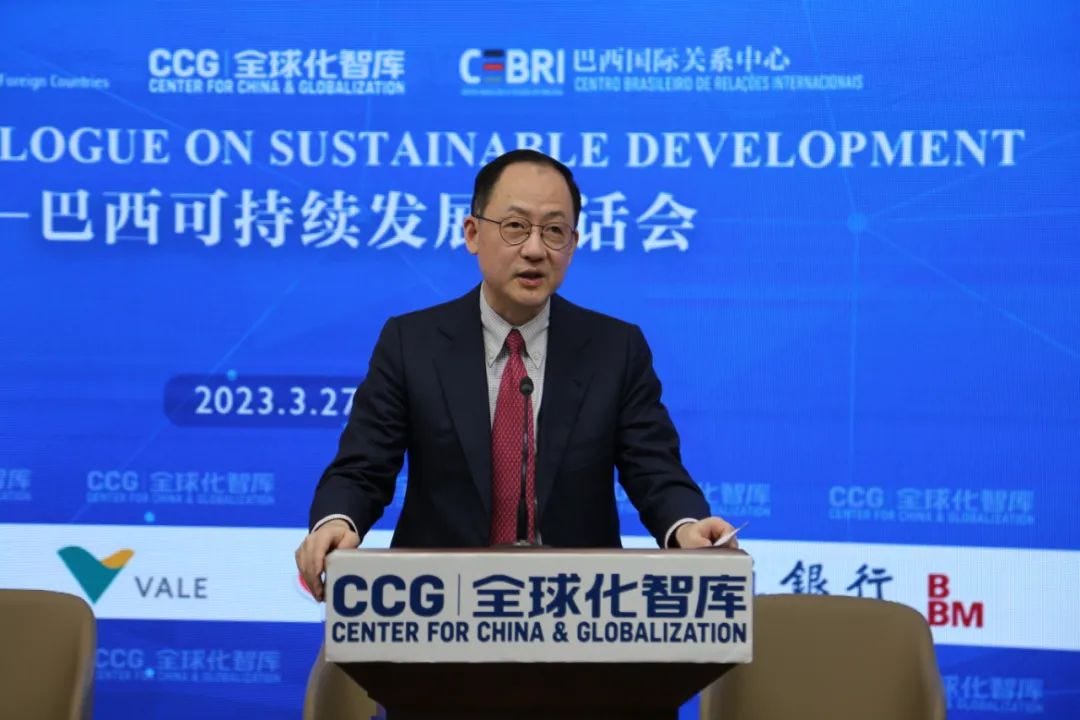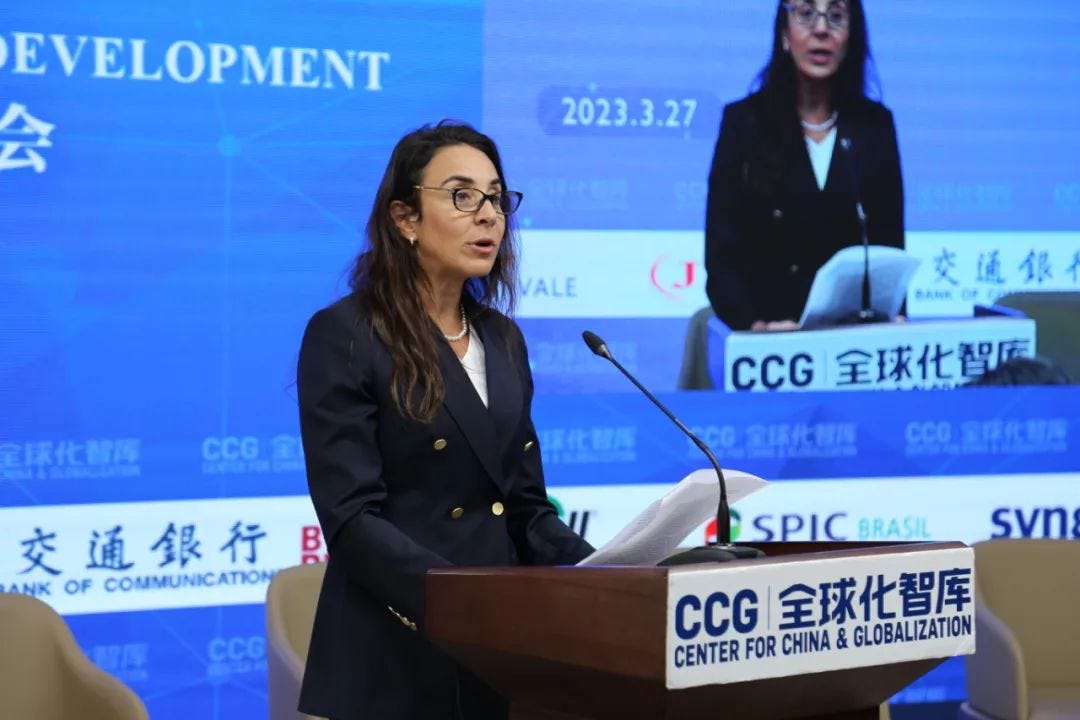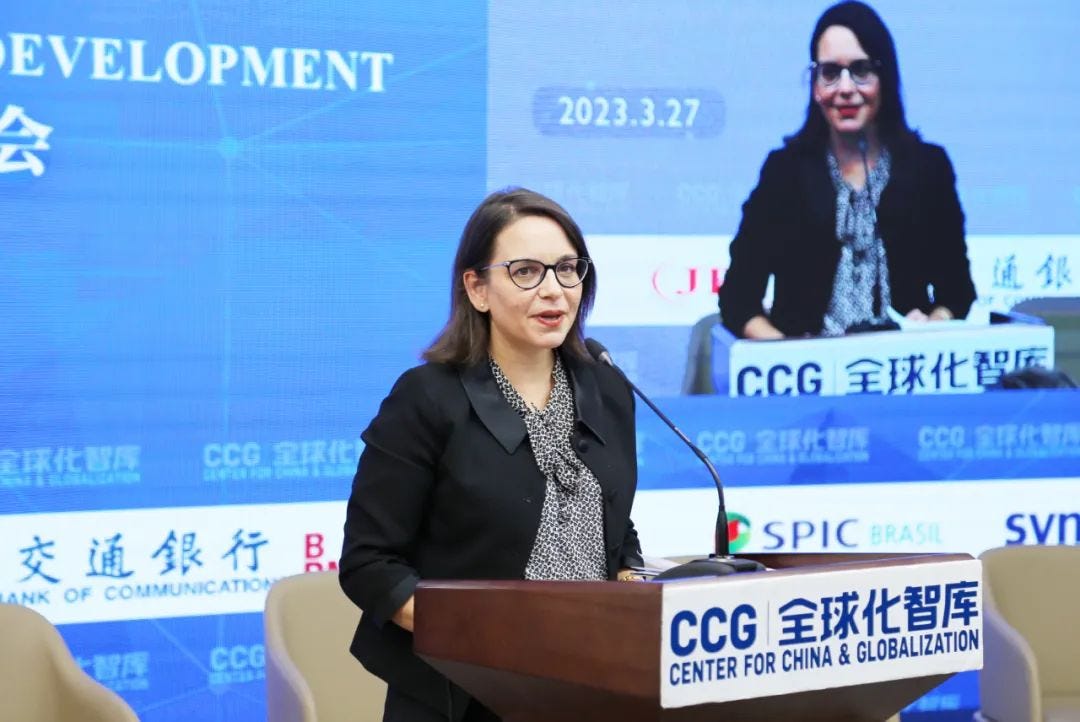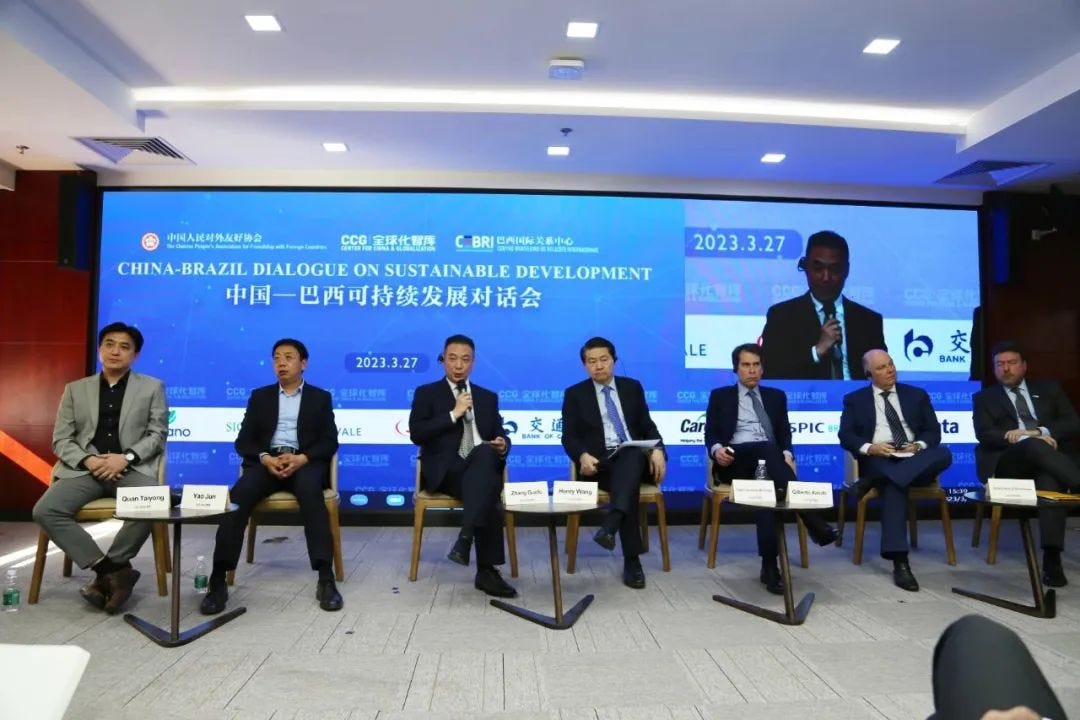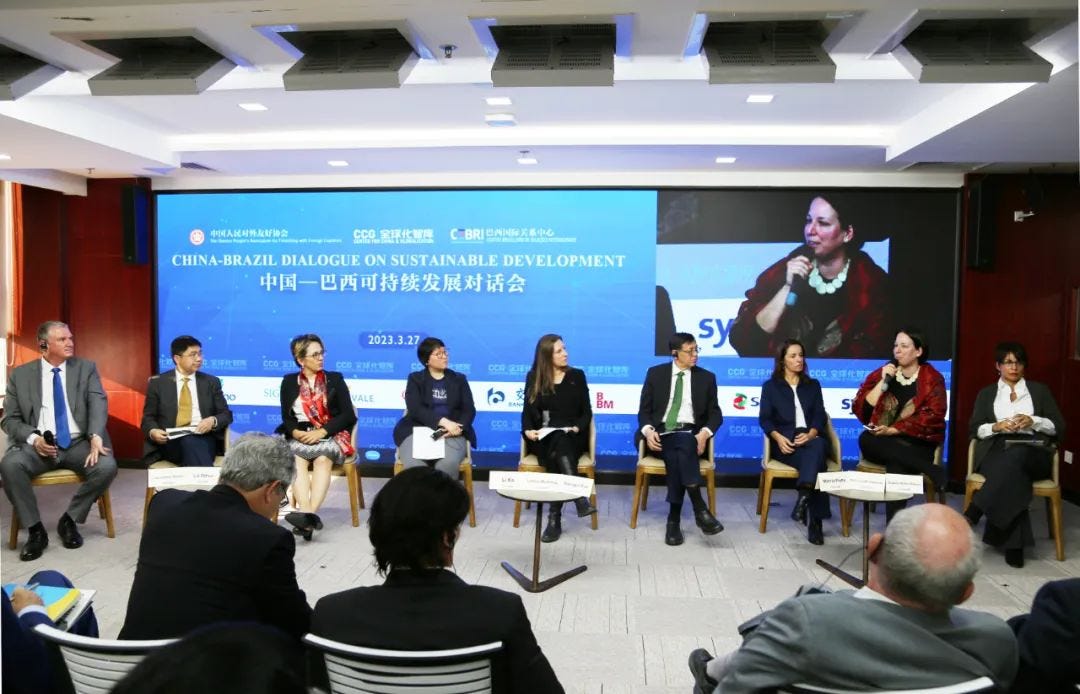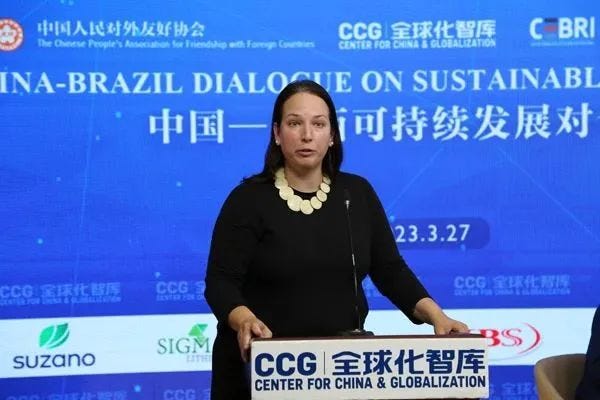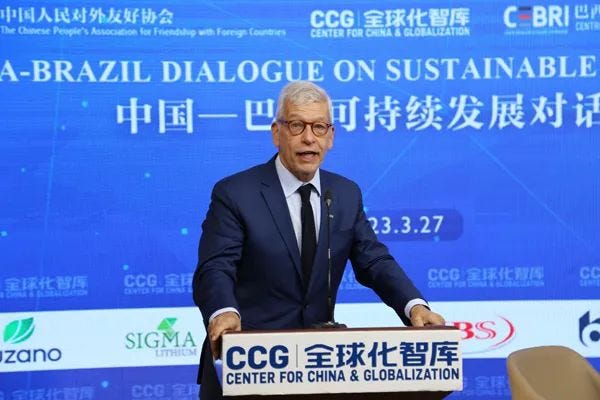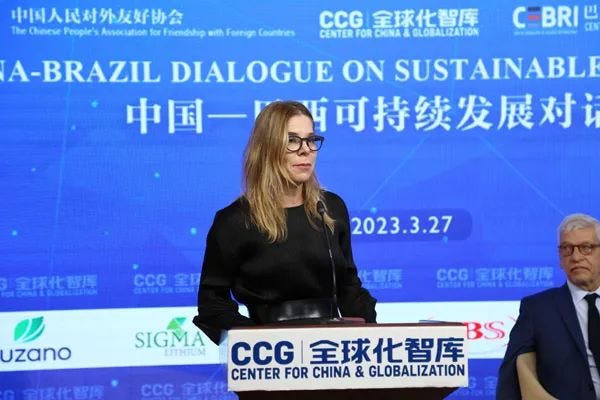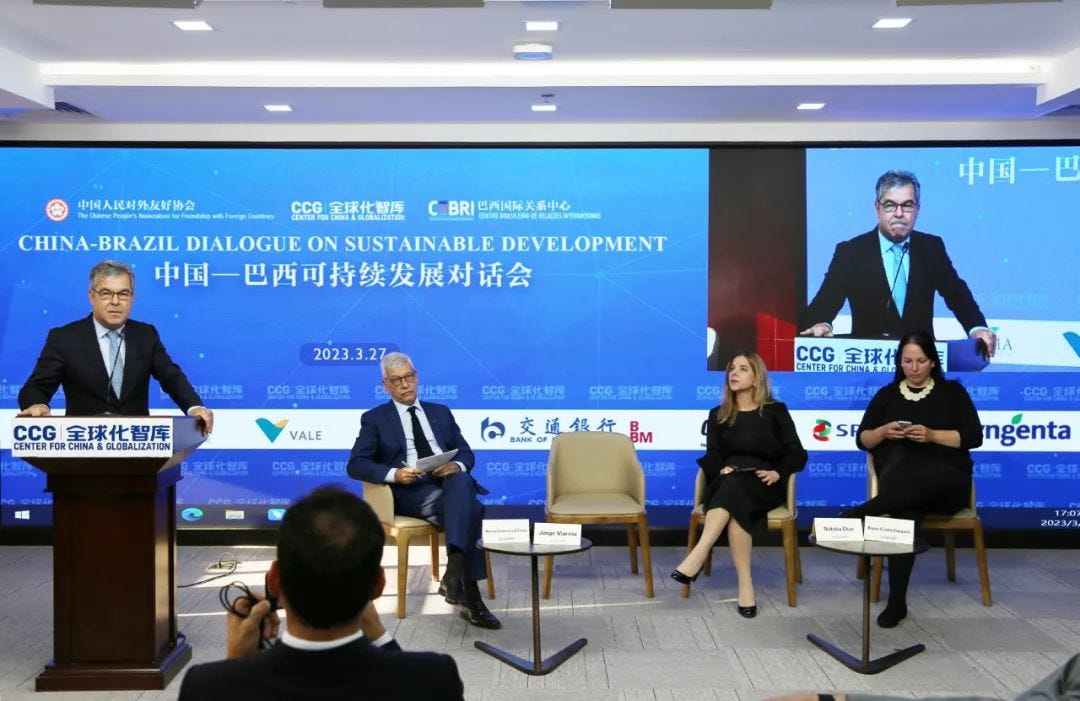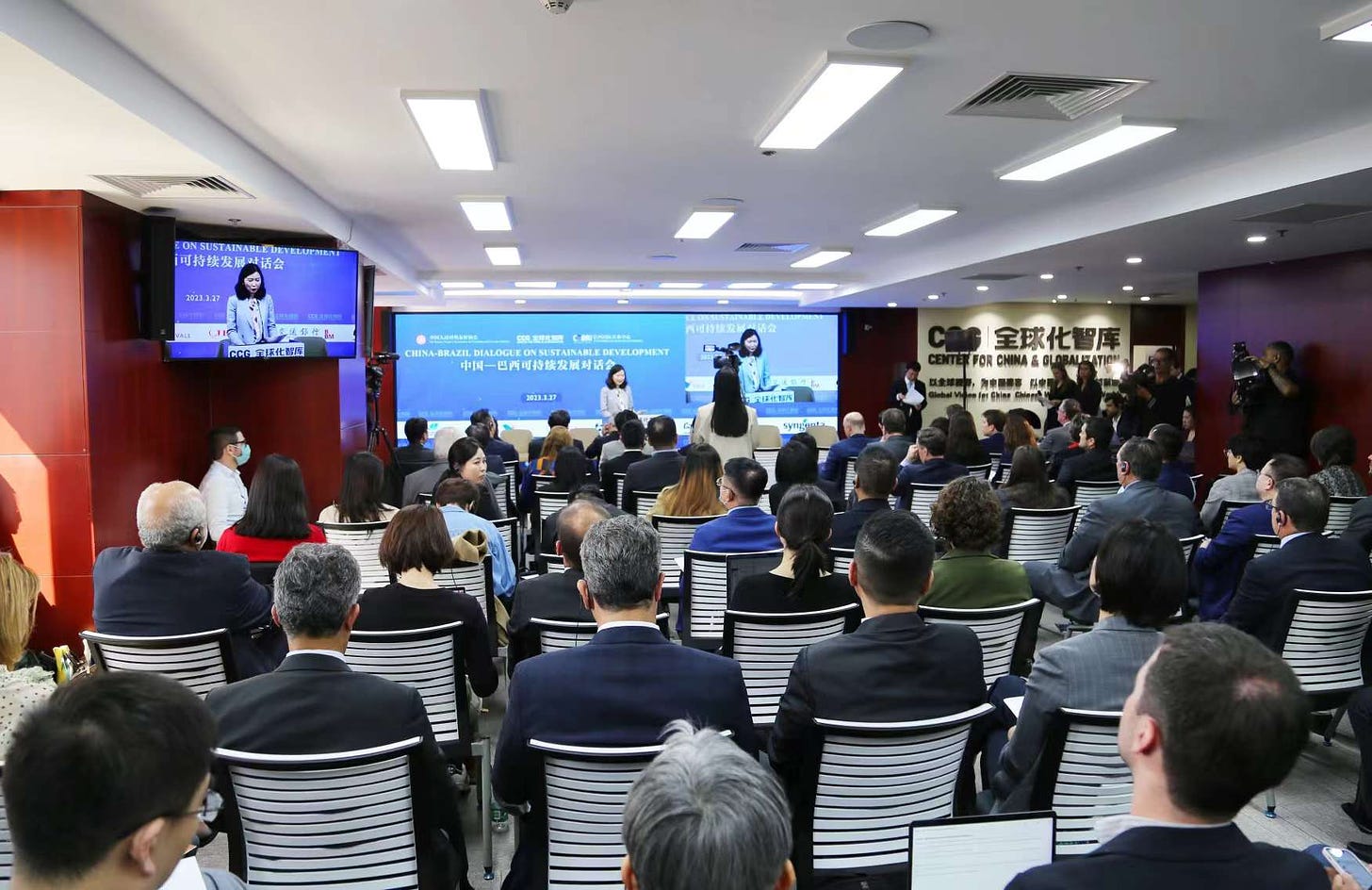Brazilian Agriculture Minister leads delegation to CCG
"China-Brazil Dialogue on Sustainable Development" in CCG office fully packed
On March 27, 2023, the Center for China and Globalization (CCG), together with the Brazilian Center for International Relations (CEBRI) and the Chinese People's Association for Friendship with Foreign Countries (CPAFFC), held the "China-Brazil Dialogue on Sustainable Development" in CCG’s Conference Hall in Beijing.
Carlos Fávaro, Minister of Agriculture, Livestock, and Food Supply of Brazil, led the Brazilian delegation to participate.
During his keynote speech, Fávaro expressed his hope that this visit to China would strengthen Brazil’s relationship with the Chinese people and restore the brotherly friendship between Brazil and China. He said that relations between Brazil and China experienced difficulties in recent years. But now with President Lula's return to office, he believes that the China-Brazil relationship is ready to get back on track and that there will be more opportunities for cooperation between the two countries. He emphasized that sustainable development is key to agricultural prosperity, and Brazil, as a major agricultural country, attaches great importance to the protection of the environment and biodiversity.
Fávaro said Brazil also attaches great importance to the protection of the Amazon rainforest. Since taking office, President Lula e has emphasized sustainable development and taken a series of corresponding measures. At the same time, Brazil has continued to strengthen cooperation with Chinese companies. This cooperation expands agricultural production and benefits Chinese companies as well, achieving a win-win cooperation. Brazil welcomes more companies to participate in China-Brazil cooperation and achieve sustainable development through technological and investment cooperation, which will benefit people of the two countries.
At the opening ceremony of the conference, Mabel Lu MIAO, Secretary-General of the CCG and Founder and Secretary-General of Global Young Leaders Dialogue (GYLD) program, Marcos Caramuru de Paiva, Member of the International Advisory Board of the Brazilian Center for International Relations and former Ambassador to China, and SHEN Xin, Director-General of the Department for American and Oceanic Affairs of CPAFFC, delivered opening remarks.
Keynote speeches were also delivered by Tatiana Rosito, Secretary for International Affairs at the Ministry of Finance of Brazil, and Adriana Erthal Abdenur, Special Advisor for International Relations at the Presidency of Brazil.
Representatives from Brazilian government departments such as the Presidential Palace, Ministry of Finance, Ministry of Agriculture and Livestock, Brazilian Trade and Investment Promotion Agency, and China's Ministry of Ecology and Environment, as well as leaders from the Brazilian Development Bank, CEBRI, Brazilian Agricultural Research Corporation, Brazilian Forestry Certification Research Institute, Federal University of Rio de Janeiro, Federal University of São Paulo, Tsinghua University, China Agricultural University, and other think tanks and universities attended the event.
Mabel Lu MIAO, Secretary-General of the Center for China and Globalization (CCG), Founder and Secretary General of Global Young Leaders Dialogue (GYLD) program, emphasized in her speech that China and Brazil are the two largest developing countries in the southern and northern hemispheres, members of the BRICS cooperation mechanism and G20 member states. Since the establishment of diplomatic relations, the two countries have maintained stable and continuous development in their relationship, and have jointly addressed global challenges through pragmatic cooperation. As Brazil's largest cooperation partner, China is willing to work together with Brazil to contribute to sustainable development. CCG has a deep connection with Brazil, and maintains close communication with the Brazilian Ambassador to China. GYLD members also include a number of young Brazilian professionals. We hope that the two sides can strengthen cooperation in clean energy, agricultural development and other sectors, and work together to achieve the United Nations' 2030 Agenda for Sustainable Development.
Marcos Caramuru de Paiva, Member of the International Advisory Board of the Brazilian Center for International Relations and former Ambassador to China, noted that both China and Brazil recognize the importance of sustainable development, highlighting Brazil’s goals in energy conservation and China’s commitments to reducing carbon emissions on an international level. The relationship between the two countries has great potential and cooperation between them is crucial for sustainable development and low-carbon transition. He said the purpose of this dialogue was to establish academic connections and identify priority issues in sustainable development. He expressed the hope that China and Brazil would not only maintain exchanges at the government level, but also strengthen cooperation at various levels of society, such as enterprises, think tanks, and universities.
SHEN Xin, Director-General of the Department for American and Oceanic Affairs of CPAFFC, said that China and Brazil, as representatives of developing countries and emerging economies with global influence, have made significant contributions to achieving the United Nations' 2030 Sustainable Development Goals. China attaches great importance to sustainable development and actively pursuing the concept of innovative, coordinated, green, open, and shared development. In the face of the ups and downs in the international environment, countries need to unite and cooperate now more than ever. Mutual learning between China and Brazil is very important. Shen expressed the hope that this dialogue would provide an opportunity for long-term cooperation with the Brazilian Center for International Relations.
Tatiana Rosito, Secretary for International Affairs at the Ministry of Finance of Brazil, mentioned that both the Chinese and Brazilian governments place great importance on sustainable development. The Chinese government has been promoting low-carbon emissions and green economic development through a series of fiscal measures and incentive policies. In 2023, Brazil also introduced green subsidies to encourage investors to participate in sustainable development. In the future, there are still broad prospects for Sino-Brazilian cooperation in the green-oriented transition of energy, infrastructure construction, and industrial development. Brazil hopes to see more Chinese companies involved, strengthening cooperation and dialogue in the fields of government, business, finance, and academics, working together to address environmental problems and achieve sustainable development.
Adriana Erthal Abdenur, Special Advisor for International Relations at the Presidency of Brazil, said that Brazil has always attached great importance to sustainable development and has been seeking sustainable development partners both domestically and internationally. All levels of the Brazilian government are also formulating relevant strategies and working to maintain good dialogue with China. She believes that the deepening cooperation between Brazil and China will be beneficial to the development of both countries in low-carbon agriculture, low-carbon economy, and other fields, and will enhance the international reputation and discourse power of the two governments, further promoting other members of the international community to fulfill their obligations more responsibly and become models of environmental protection.
The dialogue included two panels. Panel One focused on "Transition to a low-carbon economy and the contribution of businesses". Participants in the discussion included ZHANG Guofu, President of China National Tree Seed Corporation, QUAN Taiyong, Cargill, YAO Jun, Chairman of Shanxi Changrong Agricultural Technology, Pablo Gimenez Machado, Executive Director Asia and President for China of Suzano, Alexandre D'Ambrosio, Executive Vice President, Corporate and External Affairs of Vale S.A., and Gilberto Xandó, CEO of JBS Brasil. The session was cmoderated by WANG Huiyao, President of the Center for China and Globalization (CCG) and former Counselor to the State Council of China.
Panel Two focused on "Solutions for sustainable development and energy transition". LIU Dehua, Director of the China Brazil Center and Professor at Tsinghua University, FAN Shenggen, Academy of Global Food Economics and Policy at China Agricultural University, LI Xia, Director of Foreign Economic Cooperation Center of Ministry of Ecology and Environment, Suzana Kahn Ribeiro, Professor at COPPE/UFRJ, Marina Piatto, Diretora Executiva of IMAFLORA, Fabiana Villa Alves, EMBRAPA Specialist in Low Carbon Agriculture from Brazil, Karin Costa Vazquez, Non-Resident Senior Fellow of Center for China and Globalization, and Luiz Gustavo Nussio, Professor at USP/ESALQ, participated in the discussion. This session was moderated by Larissa Wachholz, Senior Fellow of CEBRI.
Toward the end, Marcos Caramuru de Paiva, Member of the International Advisory Board of the Brazilian Center for International Relations and former Ambassador to China, Natália Dias, Managing Director of Capital Markets, Fund Raising and Investor Relations, BNDES, and Jorge Viana, President of APEX ((Brazilian Export and Investment Agency) provided closing summaries.
The participants expressed appreciation for the "China-Brazil Dialogue on Sustainable Development" and expectations for future positive cooperation between China and Brazil in sustainable development and energy transition. They also emphasized the need to break down language barriers, learn from each other's solutions, and involve more academics in the drive toward sustainable development.



